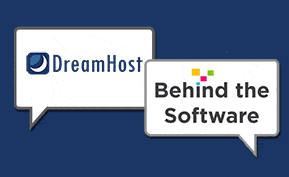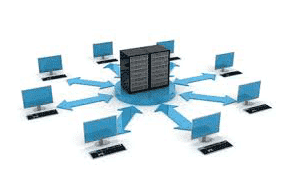Cloud Hosting
Cloud 101: What Is It & Who Are the Key Players?

The “cloud” refers to a collection of computing resources that is delivered not on-site but via an Internet connection. All software and data is stored in a central location, that a community of end-users can access via a web browser or mobile app. Cloud computing relies on the sharing of resources to deliver solutions that are high-performance and comprehensive enough to appeal to a wide audience (but customizable for individual needs). As a result, costs are kept low because resources are shared across the user community.
A Brief History of the Cloud
In the 1990s, telecommunication companies started offering virtual private networks (VPNs) that offered the same quality of service as regular networks but at a much lower cost. The trick was load-balancing: traffic was balanced according to utilization, which meant the overall network bandwidth was utilized in full. As technology advanced and the costs of computers and storage devices dropped, the demand for cloud solutions grew.
How Does It Work?
Because resources and costs are shared – a concept known as multi-tenancy – infrastructure can be centralized in a single place, rather than having to install an application at each user’s physical location. Cloud computing solutions typically deliver higher utilization rates and efficiency, because usage is load-balanced. As listed on the Top 10 Cloud Hosting report, many cloud solutions are priced on a usage basis, meaning you only pay for as much as you use the system. This makes for extremely scalable technology. Additionally, cloud computing eliminates the need for costly maintenance, because the applications are not physically installed on the user’s servers or computers.
Cloud Models
Infrastructure-as-a-Service (IaaS)
Infrastructure-as-a-Service is the most hands-on cloud delivery model. IaaS providers supply computers (physical or virtual) and the architecture needed (servers, storage space, etc.) to deploy your applications. In other words, you – the cloud user – are responsible for installing the applications and maintaining the systems. IaaS vendors typically charge on a per-use basis.
Vendors include: Amazon CloudFormation, Rackspace, Rightscale.
Platform-as-a-Service (PaaS)
Platform-as-a-Service (PaaS) providers deliver a full-blown computing platform (incl. operating system, database, servers, programming language, etc.). Cloud users can then run or develop their own applications on this platform without incurring the cost and hassle of buying and maintaining the underlying architecture.
Vendors include: Amazon Elastic Beanstalk, Heroku, EngineYard, Google App Engine, MS Azure, RunMyProcess.
Software-as-a-Service (Saas)
Software-as-a-Service (SaaS) is the most common and most popular cloud delivery model, where the provider develops and operates their applications in the cloud and subsequently gives access to its users. The SaaS model employs the full functionality and advantage of the cloud, by load-balancing utilization and eliminating support and maintenance concerns for the user; in fact, the user only uses a single access point without having to concern himself with maintaining the infrastructure. SaaS applications are normally priced on a monthly or yearly basis, per user.
Vendors include: Google Apps, Quickbooks Online, Salesforce.com, Taulia.
Delivery Models
- Public cloud: available to the general public through a service provider (like Microsoft or Google).
- Community cloud: infrastructure is shared among a specific community.
- Hybrid cloud: a mix of on-site and off-site servers, eliminating the dependency on Internet connectivity and combining the security of in-house computing with the scalability of the cloud.
- Private cloud: available only to a single organization, regardless of whether it’s hosted internally or externally.
Want to know more about Cloud Computing? For additional reading material such as articles, blogs and software reviews, visit Business-Software.com’s cloud computing resource page. To get recommendations of top Cloud Computing solutions, download Business-Software.com’s free Top 10 Cloud Hosting report.






